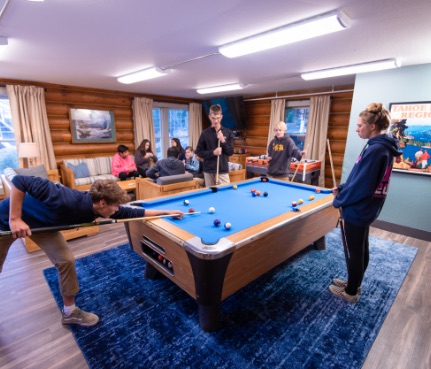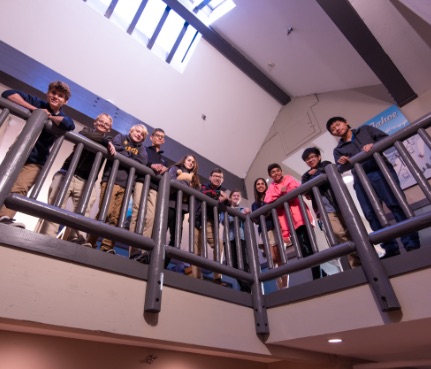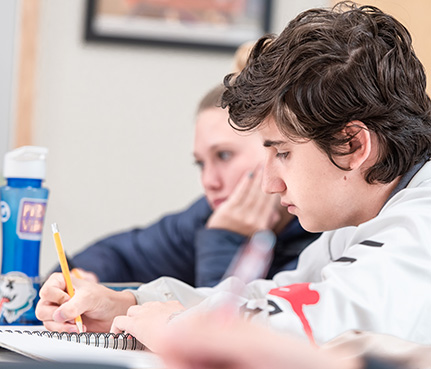California College Preparatory Boarding School
August 22nd, 2025
A College Prep Boarding School Can Help Your Teen’s Executive Functioning
Consider a College Preparatory School When Traditional Schools Fail

You’ve got a bright teenager. You’ve seen glimpses of their potential— the way they light up a room with passionate conversations or how they tackle problems with critical thinking and creativity that surprises people.
But something is off. Their school grades and test scores don’t match the effort they are putting in, school feels like a daily struggle, and homework battles have become unbearable. Your once curious kid is beginning to lose their spark, and the idea of college seems like a pipe dream.
If this hits close to home, you’re not alone in this battle. Many bright teenagers struggle in traditional school environments— even in well-ranked private schools— because the system is just not set up for who they are as individuals.
Sign 1: Your Teen Gets Lost in Large Classes
Most high school classrooms have way too many kids in them. Walk down any hallway and you'll see 30+ teenagers crammed into spaces with one teacher trying to manage them all.
A college preparatory school works differently because the numbers are just smaller. When you've got seven students instead of thirty, teachers actually get to know how each person learns. They notice right away when someone looks confused.
Students feel comfortable asking questions because they're not performing in front of a huge audience. It’s more like a tight-knit community where everyone wants to watch each other succeed.
Research demonstrates the benefits of small class sizes, indicating that this personalization actually helps prepare them for college and improves overall academic success.
Sign 2: They're Struggling with Executive Functioning and Organization

Your teen might remember every line to their favorite movie, yet forgets to turn in homework they spent hours working on. They write assignment due dates in their planner, but then never look at the planner again. They know that a big project is coming up, but can’t force themselves to sit down and work on it until the night before it’s due.
Sound familiar?
Most high schools assume students will eventually figure it out on their own. Or that parents should be constantly reminding them, or asking them when they have assignments due. Or even worse, they assume your teen is just lazy. That’s when many teachers start to give up on students. They believe that if they wanted to, they would.
Even adults would struggle with this much organizational complexity.
The problem is that schools tend to punish students when they mess up these systems instead of actually teaching them how to manage everything. Your kid gets a zero for the forgotten assignment, detention for missing the deadline, or a lecture about responsibility, but nobody sits down and shows them practical strategies for keeping track of it all.
Boarding schools approach this differently because they have to. When students live at school, the organizational skills aren't optional - they're survival skills. They learn to manage their own time and follow through with assigned tasks.
But here's the key difference: they learn these skills with support and practice, not through crisis and punishment.
Sign 3: Social Drama is Derailing Their Education
High school social dynamics can eat up enormous amounts of mental energy. When your teen spends lunch worrying about which table to sit at, or comes home stressed about some comment someone made in the hallway, there's less brain space left for actual learning.
Big schools struggle with this because they're managing thousands of students. Social problems often go unnoticed until they explode, and then the solution is usually punishment rather than resolution.
The residential aspect of a college prep boarding school creates different social patterns. Students live together in smaller communities where staff actually know everyone involved, which helps resolve conflicts when they arise. Because of this, problems get addressed and resolved quickly.
Sign 4: They Need More Challenge or Different Pacing
Some kids finish their math worksheet in ten minutes and then spend the rest of class doing nothing. Others need the full period to work through three problems, but understand the concepts just as well.
Traditional schools have to move everyone at the same speed because of testing schedules and district requirements. Your teen might be ready for much harder work, but stuck repeating stuff they learned months ago. Or they might grasp ideas deeply but need extra time to show what they know.
College preparatory schools can adapt because they're smaller and more flexible. Fast learners can accelerate. Slower processors get the time they need without being labeled as behind
Sign 5: They're Not Developing Independence
Your teenager may be bright, but do they still rely on you for everything? Do they need you to wake them up and prompt them to get ready in the morning? Can they clearly communicate a problem and resolve it without involving you? Can they do their laundry or manage their spending money?
Most high school students stay pretty dependent on their parents because the system doesn't require independence. Then they get to college and suddenly nobody's there to handle the basics.
The residential experience at a college prep boarding school builds these skills gradually.
The College Preparatory Boarding School Difference

These five signs don’t mean that your teen is hopeless or that you are failing as a parent. They are signs that indicate your teenager might thrive in a new environment— one that works better for them.
College preparatory boarding schools offer several advantages:
- Personalized attention in small classes where every student is known and supported
- Structured environment that teaches life skills and independence
- A close-knit community where social issues are addressed quickly and effectively
- Flexible academics that can challenge advanced students or provide extra support as needed
- Direct preparation for college through residential living and increased responsibility
Taking the Next Step
If these five major signs resonate with your experience at home, it might be time to explore a college prep boarding school.
Ready to explore whether we could be the right fit for your teen? Contact our college preparatory school admissions team to learn more about our supportive community and personalized approach to education.









